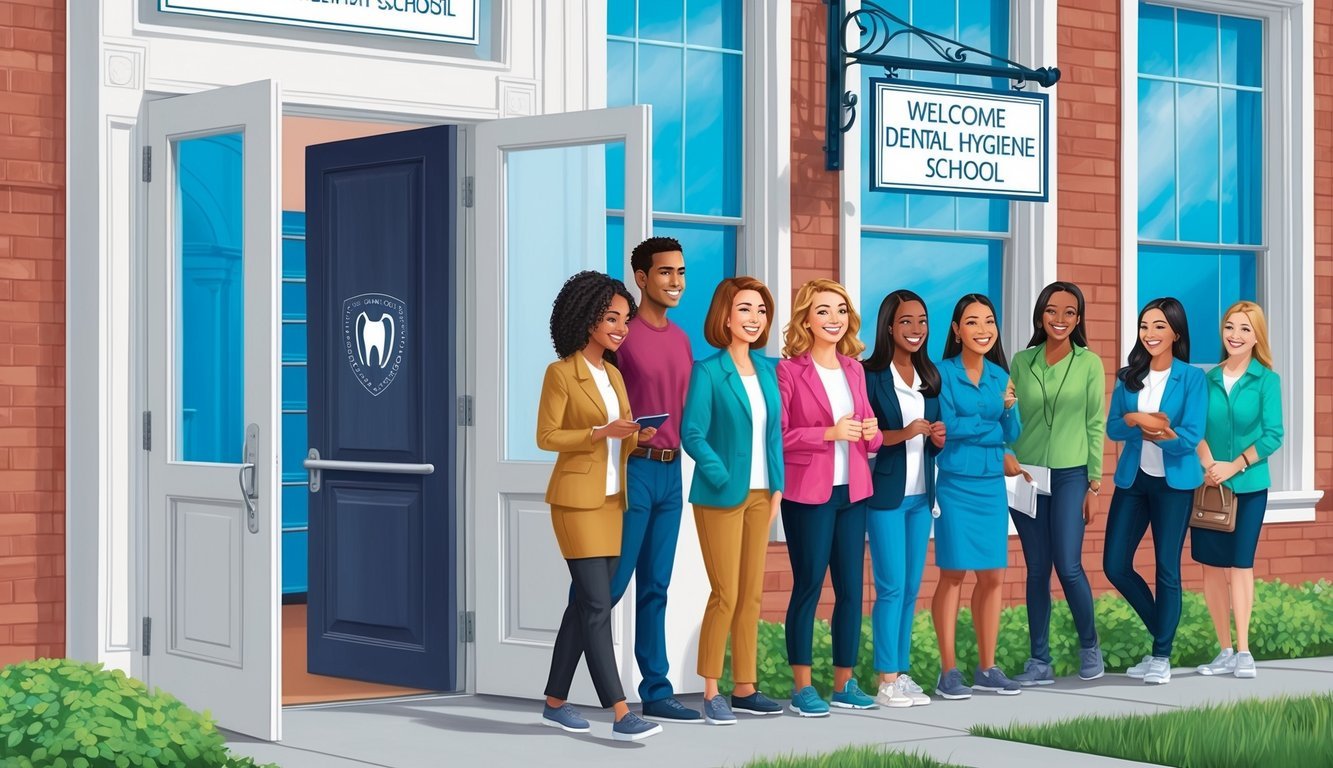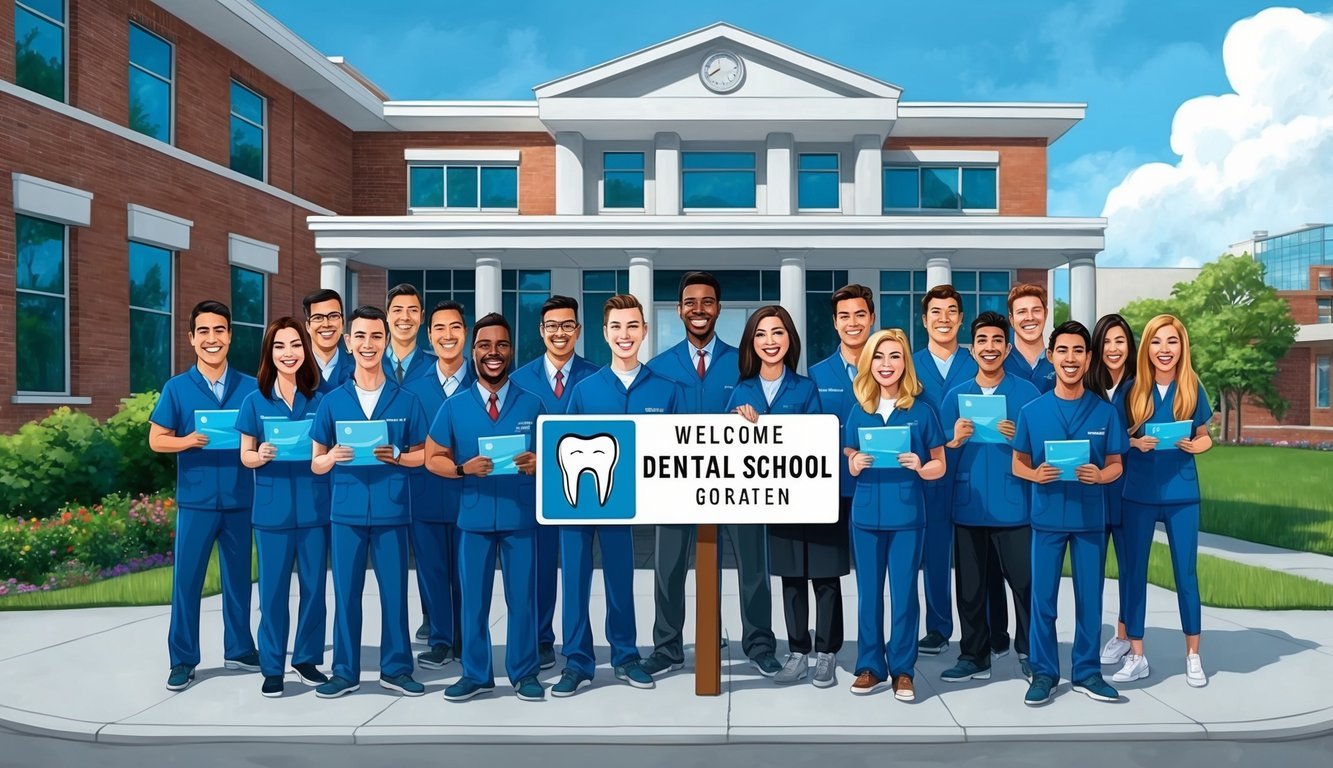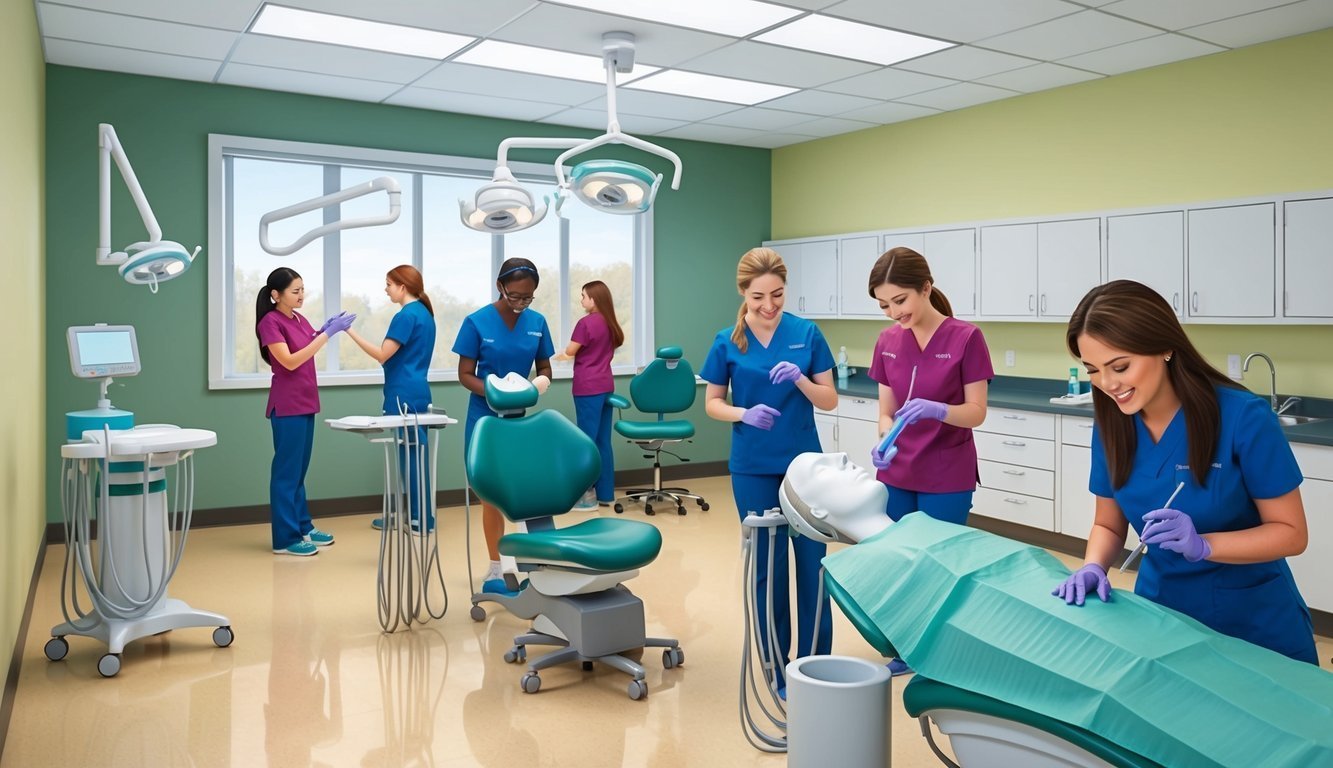Pursuing a career in dental hygiene is an excellent choice, especially if you enjoy helping others maintain their oral health.
If you’re looking for programs that make it easier to enter this rewarding field, it’s essential to know which schools have higher acceptance rates and simpler admission requirements. Many dental hygiene schools are more accessible than you might think, allowing you to start your journey with less stress.
Understanding the admission process can help you identify the right schools to apply to.
Some institutions offer stronger support and guidance, making it easier for you to meet their entrance criteria.
You will find options that not only fit your academic abilities but also provide excellent training for your future career.
In this article, you’ll discover a curated list of the easiest dental hygiene schools to get into, along with insights on their acceptance rates and what makes them stand out.
This information will guide you in making informed decisions about your education and future profession.
Key Takeaways
- Many dental hygiene programs have higher acceptance rates.
- Understanding admission criteria can simplify your application process.
- Finding schools with supportive environments can enhance your learning experience.
Understanding the Dental School Admission Process

Navigating the dental school admission process involves understanding various key criteria.
You will need to be aware of GPA requirements and standardized testing like the Dental Admission Test (DAT).
Knowing these elements can help you better prepare for a successful application.
Key Admission Criteria
When applying to dental schools, you need to consider several important factors:
-
GPA Requirements: Most dental programs require an undergraduate GPA of at least 3.0. Some schools, like the University of Mississippi, may have higher expectations, averaging around 3.7 for admitted students.
-
Prerequisite Courses: You should complete specific courses in biology, chemistry, and anatomy. These classes build a strong foundation for your education in dental hygiene.
-
Extracurricular Activities: Involvement in relevant volunteer or work experience, especially in dental settings, can enhance your application. This shows your commitment to the field.
-
Letters of Recommendation: Providing strong letters from professionals in the dental field can significantly boost your application. They need to vouch for your skills and readiness for dental school.
The Dental Admission Test (DAT)
The DAT is a critical component of your application.
Here’s what you should know:
-
Test Structure: The DAT has four sections:
- Survey of the Natural Sciences
- Perceptual Ability
- Reading Comprehension
- Quantitative Reasoning
-
Average DAT Score: A competitive DAT score is generally around 19-20. Some programs may expect scores closer to 21 or higher, depending on their selectivity.
-
Preparation: Studying for the DAT is essential. Many candidates use prep courses or practice tests to improve their scores.
-
Test Timing: Plan to take the DAT early enough to submit your scores with your application.
Factors Impacting Acceptance Rates

Understanding what affects acceptance rates is essential for your dental hygiene school application.
Several key factors play a role, including your GPA, DAT scores, and prerequisite coursework.
Each element contributes to how competitive your application is and how likely you are to be accepted.
Role of GPA in Admissions
Your GPA is one of the most significant factors in dental hygiene school admissions.
A higher GPA often indicates that you have strong academic skills, which schools value.
Most programs look for a minimum GPA of around 2.5 to 3.0, but higher averages can improve your chances.
| GPA Range | Acceptance Rate |
|---|---|
| 3.5 – 4.0 | High |
| 3.0 – 3.4 | Moderate |
| Below 3.0 | Low |
Strong performance in relevant courses, particularly in science subjects, can make your application stand out.
Influence of DAT Scores
The Dental Admission Test (DAT) is another critical factor in the admissions process.
While some dental hygiene programs may not require the DAT, if it’s needed, a strong score can significantly enhance your application.
Most programs look for a score of at least 18 to 20, but competitive programs often prefer scores above 20.
| DAT Score Range | Acceptance Rate |
|---|---|
| 20 – 30 | High |
| 18 – 19 | Moderate |
| Below 18 | Low |
A solid DAT score reflects your preparedness for the program.
Prerequisite Coursework
Completing prerequisite coursework is essential for getting into dental hygiene programs.
Most schools require specific courses, such as biology, chemistry, and math.
Failure to complete these courses or achieve passing grades can hinder your acceptance.
| Common Prerequisites | Minimum Grade Needed |
|---|---|
| Biology | C or better |
| Chemistry | C or better |
| Anatomy and Physiology | C or better |
Meeting these specific requirements shows your readiness for the academic challenges of dental hygiene school.
Programs with Higher Acceptance Rates

Many dental hygiene programs are known for their higher acceptance rates, making them accessible options for aspiring students.
Here are a few programs that stand out in this regard, providing solid education with a welcoming admission process.
University of Mississippi Dental Programs
The University of Mississippi offers a dental hygiene program with an acceptance rate of about 22%.
This program is known for its focus on practical training and hands-on experience.
You will benefit from state-of-the-art facilities and clinics that allow you to work closely with patients and instructors.
Courses cover essential topics such as oral health promotion and disease prevention.
This practical approach helps you gain skills that are crucial for your future career.
The supportive faculty makes the learning environment encouraging, helping you to thrive academically.
For more details, you can explore their program here.
University of Puerto Rico School of Dentistry
The University of Puerto Rico School of Dentistry provides an inviting atmosphere for students looking to enter the dental field.
With a competitive yet accessible acceptance rate, this program emphasizes community service and public health initiatives.
You will engage in diverse clinical experiences throughout your education.
The curriculum integrates both classroom learning and practical skills, ensuring you are well-prepared for licensure exams.
You will also have opportunities to work with a variety of patient populations, enhancing your skills in real-world settings.
Find more information about their program here.
East Carolina University Dental Education
East Carolina University’s Dental Education program is another excellent choice for students.
With an acceptance rate that appeals to many applicants, this program is well-regarded for its comprehensive education model.
The curriculum includes extensive coursework in fundamental dental hygiene subjects, allowing you to build a robust knowledge base.
You will also participate in community outreach programs, which are vital for gaining experience and understanding diverse patient needs.
The faculty is dedicated to student success and provides guidance throughout your education.
Explore their offerings here.
Advantages of Easier-to-Enter Schools
Attending an easier-to-enter dental hygiene school can offer several benefits.
These include a more accessible application process and possibly less intense competition among candidates.
Understanding these advantages can help you make an informed decision about your education.
Quality of Education Considerations
Easier-to-enter dental schools often maintain a solid quality of education.
Many of these institutions focus on providing a student-centered approach.
Smaller class sizes allow for more personalized attention from instructors.
Additionally, many of these schools have experienced faculty who are committed to student success.
For example, programs such as those at the University of Mississippi Medical Center have a good reputation.
While acceptance may be easier, the curriculum still prepares you for real-world challenges in dental hygiene.
Programs emphasize practical skills through hands-on training and clinical experiences.
You can gain valuable training that meets industry standards.
Competition Among Candidates
The easier admission process typically leads to lower competition among candidates.
With less pressure to meet high entry requirements, you may feel less stressed during the application process.
This environment allows for a more diverse range of students to enter the field.
You might find peers who bring different backgrounds and perspectives.
Moreover, this can create a more supportive atmosphere within the school.
In turn, this fosters collaboration over rivalry.
You can build strong relationships with classmates, improving your learning experience.
The blend of a supportive community and quality education can enhance your academic journey in dental hygiene.
Profiles of Select Easy-Entry Dental Hygiene Schools

When exploring dental hygiene programs, a few schools stand out for their easier entry requirements.
Here are some options you might consider:
| School Name | Acceptance Rate | Notable Features |
|---|---|---|
| University of Minnesota School of Dentistry | ~35% | Offers robust clinical experiences and diverse courses. |
| Arizona School of Dentistry | 20% | Integrated learning with hands-on training opportunities. |
| Southern Illinois University School of Dental Medicine | 40% | Known for supportive faculty and a strong community focus. |
These institutions have structured programs aimed at preparing you for a career as a dental hygienist.
Their acceptance rates indicate a more accessible entry point compared to other schools.
The University of Minnesota focuses on comprehensive training, giving you access to advanced technology.
The Arizona School of Dentistry emphasizes patient care, and the Southern Illinois University highlights mentorship from faculty.
Research these programs further to understand what they offer.
This helps you make an informed decision about your future in dental hygiene.
For more detailed information, check resources like NursingProcess.org.
Frequently Asked Questions

When considering dental hygiene programs, you might have specific questions about their admission criteria, requirements, and overall competitiveness.
The following details will help clarify common inquiries about the admissions process.
What criteria determine the ease of admission to dental hygiene programs?
Several criteria determine how easy it is to get into dental hygiene programs.
These may include the acceptance rate, prerequisites, and whether the program has a robust support system for prospective students.
Programs that require less competitive grades or standardized test scores might be easier to enter.
What are the admission requirements for dental hygiene schools with high acceptance rates?
Dental hygiene schools with high acceptance rates often have more flexible admission criteria.
Common requirements may include a high school diploma or equivalent, completion of prerequisite courses, and letters of recommendation.
Some may also require experience in a health-related field or community service hours.
Which states have dental hygiene programs with less competitive admissions?
States with less competitive admissions typically include places with fewer applicants.
For example, schools in rural areas or those in regions with less population density often accept more students.
Researching local schools in states like Mississippi or Alabama may yield programs with higher acceptance rates.
How can I identify dental hygiene schools that offer accelerated programs?
You can identify accelerated programs by checking the schools’ official websites or program descriptions.
These typically highlight their duration and intensity.
You can also contact admissions offices directly to ask about their accelerated options, which often allow students to complete the program in a shorter time frame.
What are the academic prerequisites for enrolling in a dental hygiene program?
Most dental hygiene programs require specific academic prerequisites.
Commonly required courses include biology, chemistry, and anatomy.
Some programs may also expect candidates to have completed courses in communication or psychology to prepare for patient interactions.
Are there any dental hygiene schools that are known for accepting a high volume of applicants?
Yes, some dental hygiene schools are known for their high acceptance rates.
These schools often have larger cohorts and more flexible admission standards.
For example, the University of Mississippi has an acceptance rate of around 44.3%.

